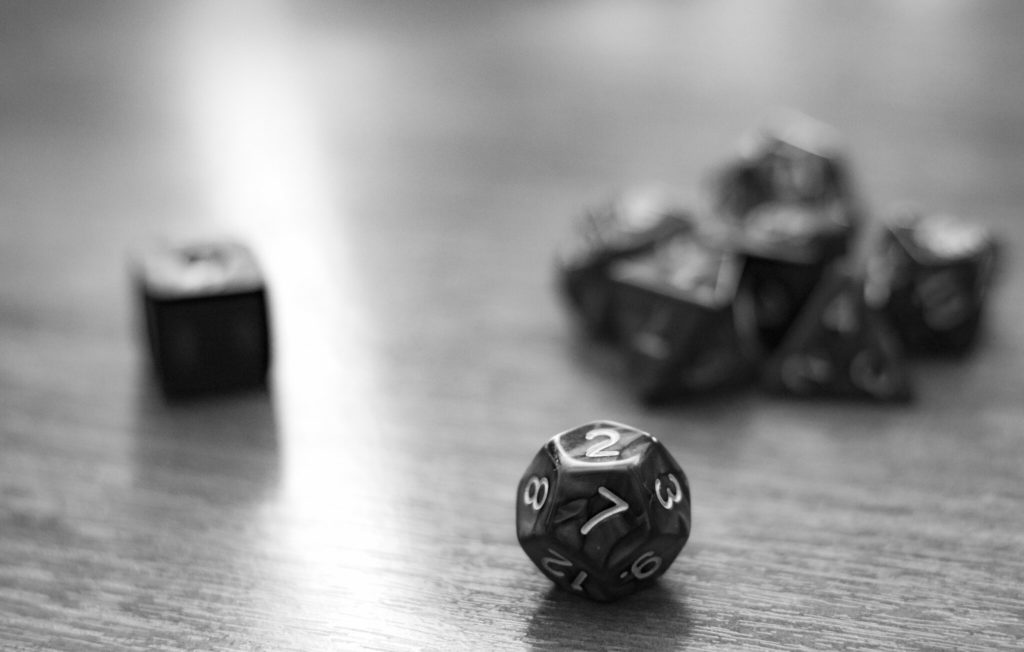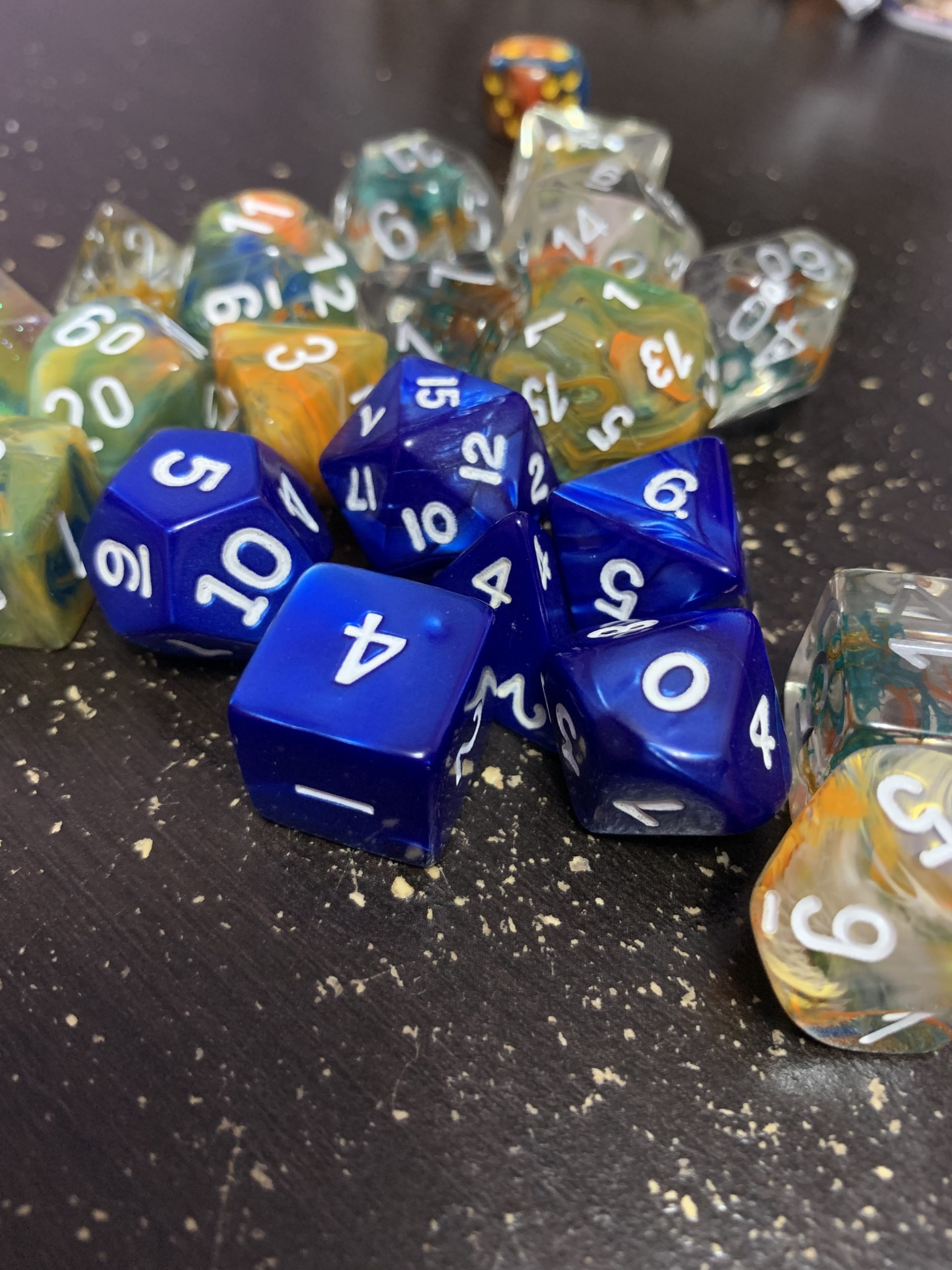I write fiction in my spare time and have consistently for nearly eight years now. When I was very little, I used to tell my stories verbally to my friends. The theatrics of live storytelling has always been something I enjoyed. Dungeons and Dragons (D&D) feels like that. Imagine writing a story out loud, now, imagine co-writing that story alongside nine other people with a very fluid plot and rules. It’s a spectacular chaos filled with extreme highs and lows.
It’s no secret that we at the Clarion are, for the most part, big nerds. However, the general public might be unaware that back in early October of 2019, we formed an unofficial joint Dungeons & Dragons party between us and a few members of Sinclair’s Bright Signal Alliance with Clarion photographer Brian Walker as our leader.
Our group has met weekly since, not counting the odd weekends where a majority of us were too busy to. Before quarantine, we made D20, the local D&D bar, into a second home for ourselves and added a few players outside the main groups of the Clarion and Bright Signal. (Speaking of which, support local business whenever you can right now.)
In pop culture, D&D is typically portrayed as a group of men in one of their mother’s basement. They gather around a candle-lit table covered in junk food while wearing dollar store costumes, argue over math and throw a pile of funny dice. While players do occasionally cosplay, it’s not a requirement.
Also, the gender gap of players is greatly decreasing. Personally speaking, my own party is seven women to three men‒a relief to the common problems associated with being the only girl present.
House games are still quite common, but now there is a growing trend of having community bars or clubs houses for players to be more social. Math in D&D is almost always a basic addition. Nobody would argue over it. A dice set is typically made up of seven dice.
There’s the 20-side die, or D20, the 12-sided die or D12, the 10-side die or D10, the 8-sided die or D8, the six-sided die or D6 and the 4-sided die or D4. 90% of the time the only die the player uses is D20. The rest are used typically in battle, but we almost never use them all at once.

D&D isn’t as complicated as it appears at first glance. The first thing you pick is your character’s race. Note, race in D&D refers to if they are a mythological creature or humanoid, not skin tones. For example, mythological creatures include orcs, half-lings, etc.
Next is class. Class is not an economical place, but more an occupation or defending characteristic. These include, but are not limited to, a bard, a fighter, a ranger, a wizard, a rouge, etc.
There is a list of all the rules that apply to each race and class in the DM’s guide book. These rules are the lifeblood and launching point for your character. However, there is a lot of freedom in creating your appearance, backstory, and personality. After the group of players create their characters, they are a party.
The dungeon master, often referred to as a DM, either creates or uses a pre-created campaign for these characters to adventure forth in. They could last anywhere from three months to years. The players use their rules and earn points each time they play together in a session. Over time, the points add up, causing the players to earn levels which grant them new skills overtime.
Currently, our group is facing our biggest opponent yet – the leader of an army of shapeshifters. I have a suspension that the leader will be a multiple session fight. Our sessions are four to five hours. I am beyond excited about it, and I theorize so many things about the character in our group chat, undoubtedly giving Brian free inspiration to use later against our characters in battle. He is a good fiction writer. I’ve seen his foreshadowing of this in previous sessions.
However, the bigger reward is the friendships we’ve formed. I’m never lonely anymore with a group chat that often hits 70+ messages a day. Someone is always up to talk about life or joke about the frustrations of college.
These friendships run deep, and I truly know that any of them would help me in a time of crisis and I would for them. It’s refreshing and probably one of the happiest things in my entire life.
The effect on my own happiness has been profound. College caused a lot of frantic changes to my life. I had to handle the change in responsibility from high school to full-time college and navigate my first paying job while fearing I would mess it up. My best friends of over a decade were suddenly gone, moved away or busy.
It left me resentful and bitter, feeling like I was all alone again. I was terrified. Having started working at the Clarion in July 2019, I was already making fast friends with my coworkers. A D&D group seemed like a wonderful addition to my life. That was, for the first time in forever, not going 200 miles per hour with 15 extracurriculars. I didn’t know just how much I needed something like it.
It was never a question after the quarantine began that we would find any safe way possible to continue our game. And try we did. YouTube banned our livestream for copyright. Discord crashed practically anytime more than five of us used it. (To be fair they have done a system overall after the beginning of quarantine.) Google Hangouts never wanted to work and was just as bad as it was back in 2014. Skype has zero users but is still laggy.
Zoom is currently where we house our game and seems to be our long-term solution until the world is safe again. It hurts not seeing their faces weekly. It hurts when my crappy wifi drops me from a game, but we know it is the responsible thing to do. Keeping a 5-hour weekly distraction where I force myself to try not to look at the news, work, or school. Just five hours of hearing my friends weekly have done more good for me in quarantine than I could ever understand.
LeAnne McPherson
Multimedia Director and Reporter


